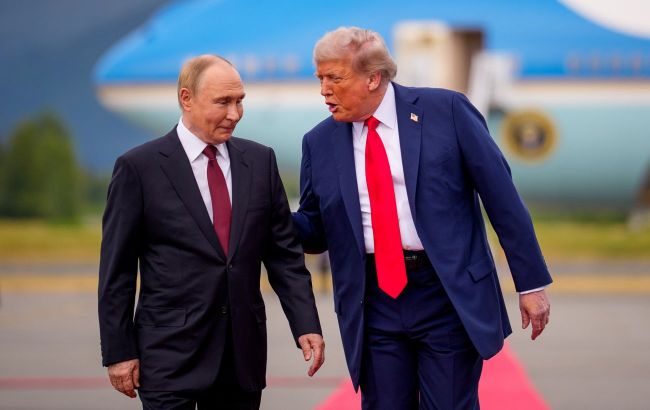Sanctions bite early: US oil measures already hitting Russian economy hard
 Photo: US and Russian Presidents Donald Trump and Vladimir Putin (Photo: Getty Images)
Photo: US and Russian Presidents Donald Trump and Vladimir Putin (Photo: Getty Images)
American oil sanctions have not yet formally taken effect, but they are already inflicting significant damage on Russia’s economy—and this impact is expected to intensify. How Russia’s partners reacted to the blacklisting of Rosneft and Lukoil – read in the RBC-Ukraine report below.
Less than two weeks have passed since the announcement of US sanctions against Russian energy giants Rosneft and Lukoil, but there are already quite convincing signs that the measures taken will yield significant results in the near future.
Total losses could reach $70 billion
According to Ukrainian intelligence, the first detailed assessments of the impact of US sanctions confirm that Russia’s losses from the suspension of global cooperation with Rosneft and Lukoil will amount to at least $50 billion per year.
"American sanctions will probably come into effect on November 20, 2025, unless there are delays. After these sanctions, Russia, according to our data, will lose $50 billion next year," said Volodymyr Zelenskyy.
Together with the 19th sanctions package, whose damage to Russia is estimated at up to $20 billion annually, total losses could reach $70 billion—almost half of all Russian military expenditures.
Meanwhile, within days of the US decision targeting Russian oil companies, the price of Russian oil sharply fell, Reuters reported.
Chinese refineries have already decided to cancel part of their purchases of Russian crude oil.
Refineries in India also announced their intention to reduce imports of Russian oil. As a result, spot sales of ESPO crude began to be offered at a discount of 50 cents per barrel, whereas before the sanctions, there was a $1 premium.
Prices for other grades of oil, by contrast, rose. The Brent futures climbed by about 5.4% to $65.99 per barrel, and WTI by about 5.6% to $61.79 per barrel, Reuters reported. However, within days, prices began to decline again: on October 28, Brent dropped to $64.4, and WTI to $60.15 per barrel.
In Russia, the negative impact of US sanctions has been acknowledged, though officials are avoiding dramatization. Vladimir Putin called Trump’s decision an "unfriendly act" that harms US-Russian relations. He noted that under sanctions pressure, he does not intend to change his strategy.
The companies under sanctions, however, are deeply concerned. Lukoil has already announced its readiness to sell its foreign assets to Gunvor Group, co-founded by Putin’s ally Gennady Timchenko.
Experts estimate Lukoil’s foreign assets at $12–15 billion, but due to sanctions and the urgency of the deal, they may be sold at a 50–70% discount from market value, according to Radio Liberty.
In Germany, authorities are discussing the nationalization of Rosneft subsidiaries, and officials are also considering confiscating facilities and selling them to foreign investors.
Russian analysts forecast increased costs for oil companies and a delayed effect from the sanctions. The extent of this impact will depend on the degree to which India and China reduce their imports of Russian oil and Russia’s ability to find new buyers.
Former Ukrainian presidential adviser Oleh Ustenko believes that Russia will not find new buyers under US sanctions.
"I don’t see who would buy their oil. China, even if it continues importing, will not increase the volume," he told RBC-Ukraine.
India and China refuse Russian oil
China and India remain Russia’s largest oil buyers, followed by Turkey and the European Union. However, there are already signs of declining imports.
"We already see that India and China will reduce imports of Russian oil, and we must ensure there’s no sanctions evasion through third countries," said Zelenskyy recently.
Chinese oil refiners—including both state giants Sinopec and PetroChina Co and smaller private plants—are rejecting Russian deliveries, Bloomberg reports. Reductions are being recorded from previous volumes of about 400,000 barrels per day.
In India, major refiners MRPL, Mittal Energy Ltd, and Reliance Industries also temporarily halted oil deliveries from Lukoil and Rosneft after the sanctions announcement. However, in recent days, one of India’s largest refineries, Indian Oil Corp, has resumed purchases from other Russian companies with December deliveries.
Reselling oil from Rosneft and Lukoil to other Russian firms not under sanctions is one of the workarounds Moscow is using. This mechanism has proven effective in maintaining export flows. However, its effectiveness now depends on how strictly the US enforces compliance.
Ukraine will also join these control efforts, Zelenskyy said. Kyiv will closely monitor Russian attempts to circumvent restrictions, including through resales or asset transfers in Europe to proxy entities.
"We see how much Russia will lose if there are no delays or postponements. Some may try to rewrite or sell assets, but it’s crucial that those assets in the EU continue to operate. We must detect and report such cases to our partners," the president said.
According to Vladyslav Vlasiuk, Ukraine’s presidential envoy for sanctions policy, contracts for transporting Russian oil to India and China have fallen by nearly 20% over the past two weeks.
"US sanctions will take effect only on November 20. So they haven’t even started yet—and there are already visible results," Vlasiuk said.
The negative effects of US sanctions on Russia will not be immediate, Donald Trump said—he expects them by summer next year.
"Let’s see in six months," he commented regarding the sanctions’ impact.
According to Oleh Ustenko, even if Russia’s losses reach the maximum projected level, the sanctions will not force Putin to end the war—but they will significantly limit Russia’s military potential.
"I think under US oil sanctions, Russia’s ability to sustain aggression will last only 12 months, not two years as it might have otherwise," he told RBC-Ukraine.
At the same time, the risk of easing or delaying sanctions—as has sometimes happened with US measures against China—is considered very low in Ukraine.
Zelenskyy called that risk zero. Kyiv, he added, is counting on a strong partnership with Washington, since the US has become the driving force that pushed European allies to impose “total sanctions” not only on Russian oil but also on Russian gas.
Sources: Bloomberg, Reuters, Radio Liberty, and public comments by officials and experts for RBC-Ukraine.

